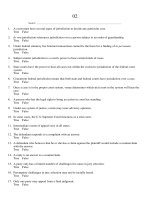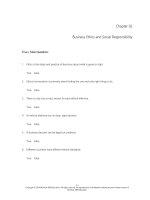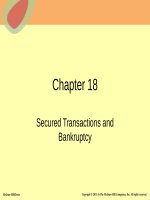- Trang chủ >>
- Thạc sĩ - Cao học >>
- Luật
Lecture Dynamic business law, the essentials (2/e) - Chapter 14: Formation and performance of sales and lease contracts
Bạn đang xem bản rút gọn của tài liệu. Xem và tải ngay bản đầy đủ của tài liệu tại đây (234.88 KB, 24 trang )
Chapter 14
Formation and Performance of
Sales and Lease Contracts
McGrawHill/Irwin
Copyright © 2013 by The McGrawHill Companies, Inc. All rights reserved.
The Uniform Commercial Code
(UCC):
A uniform/model law that governs
commercial transactions, including
contracts for the sale of goods, leases,
and secured transactions
142
UCC Outline (Articles and Topics)
•
Article 1: General Provisions
•
Article 5: Letters of Credit
•
Article 2: Sales
•
Article 6: Bulk Transfers
•
Article 2(A): Leases
•
Article 7: Documents of Title
•
Article 3: Negotiable
Instruments
•
Article 8: Investment
Securities
•
Article 4: Bank Deposits and
Collections
•
Article 9: Secured
Transactions
•
Article 4(A): Wire Transfers
143
UCC Article 2
Applies to contracts for the sale of
goods
144
UCC Article 2 Terminology
• Sale: The passing of title from seller to buyer for a price
• Goods: Tangible things that can be moved (Examples: Automobiles,
furniture, electronics)
• Mixed goods and services contracts: Contracts that include both goods
and services. UCC Article 2 applies to contract if goods are
“predominant part” of transaction
• Merchants: Buyers or sellers who
-Deal in goods of the kind involved in contract
-By occupation, represent themselves as having knowledge and skill
unique to goods involved in transaction, or
-Employ a merchant as a broker, agent, or other intermediary
145
UCC Article 2(A)
Applies to contracts for the lease
of goods
146
UCC Article 2(A) Terminology
• Lease: Transfer of right to possession and use
of goods for a term, in return for consideration
• Lessor: Person who transfers right to
possession and use of goods under lease
• Lessee: Person who acquires right to
possession and use of goods under lease
147
How Sales and Lease Contracts Are Formed
Under The UCC
• Formation in General: UCC more lenient than common law
regarding contract formation; courts evaluate intent of parties to
sales or lease contract
• Offer and Acceptance
-Offers valid even if terms left open
-“Mirror-image” rule does not apply
-Courts evaluate each case individually to determine whether
additional terms allowed
• Consideration: Mutual consideration required upon forming
agreement. When sales/lease contracts modified, modifications
need not be supported by additional consideration
148
The UCC and Open Terms
Term Left Open, and Interpretation Under UCC
• Price: “Reasonable Price” at time of delivery
• Payment: When buyer receives goods
• Delivery: Seller’s place of business
• Time for Performance: “Reasonable” time
• Duration of Contract: “Reasonable” period of time, with termination
allowed in good faith, and upon notice
• Quantity: Contract fails for lack of definiteness
149
UCC Statute of Frauds
General Rule: Contracts for sale of goods
must be in writing if goods valued at $500 or
more; lease contracts that require payments
of $1,000 or more must also be in writing
1410
Unconscionability
Definition: In context of UCC contract for
sale of goods or lease, an agreement that
is so unfair or “one-sided” that court
refuses to enforce it
1411
Contracts for the International Sale of
Goods (CISG)
• Definition: Treaty governing international “business-tobusiness” sales contracts
• Many major trading nations have signed the CIS
• Significance of CISG: Important because CISG (rather than
UCC) governs international sales contracts
• Advantage of CISG: Provides clarity, predictability, and
uniformity for global businesses
1412
Title, Risk of Loss, and
Insurable Interest
1413
Categories of Title
• Good Title: Acquired from someone who
already owns the goods “free and clear”
• Void Title: Not true title
-Example: Purchase of stolen goods
• Voidable Title: Occurs in certain situations
in which contract between original parties
would be void, but goods have already been
sold to third party
1414
UCC Article 2 Rules Regarding Title
Acquisition
• Good Title: Acquired from someone who has rightful
ownership
• Void Title: Results when someone acquires possession of
stolen goods
• Voidable Title results when:
-Buyer deceived seller regarding his/her identity
-Buyer wrote bad check
-Buyer committed criminal fraud in securing goods
-Buyer and seller agreed title would not transfer until later
time
-Buyer is a minor
1415
Acquiring Good Title
General Rule: If “third party purchaser”
makes “good-faith” purchase for value,
he/she gets good title (not void/voidable
title)
1416
Acquiring Good Title
General Rule: If owner entrusts possession
of goods to merchant who deals in goods of
that kind, merchant can transfer all rights in
the goods to a buyer in the “ordinary course
of business”
1417
UCC Terminology Regarding Transfer of Title
• “Ownership”—Transfer of Title
• “Encumbrance”—Goods used as collateral for debt
• “Loss”—Refers to which party has “risk of loss”
when goods damaged/destroyed
• “Insurable Interest”—Right to insure goods against
any risk exposure
1418
Types of Sales Contracts
“Simple Delivery” (Definition): Buyer and seller
contract, buyer leaves with goods
• Title transfers to buyer when contract
executed
• Risk of loss transfers to buyer when buyer
takes possession
• Buyer has insurable interest upon receiving
title
1419
Types of Sales Contracts
“Common Carrier Delivery” (Definition): Buyer and seller
contract, seller then places goods with common carrier
• “Shipment” Contract: Title transfers to buyer at time
and place of shipment; buyer bears risk of loss while
goods in transit
• “Destination” Contract: Seller bears risk of loss until
seller delivers goods to stipulated destination
1420
Shipping Terms Specifying Requirements For Delivery
(Term and Explanation)
• FOB (“Free on Board”): Selling price includes transportation
costs, and seller has risk of loss to either place of shipment,
or place of destination
• FAS (“Free Alongside”): Seller, at seller’s expense, delivers
goods alongside ship before risk transferred to buyer
• CIF or CF (“Cost, Insurance, and Freight”; “Cost and
Freight”): Seller places goods in possession of carrier
before risk passes to buyer
• Delivery “Ex-Ship” (Delivery From Carrying Vessel): Risk of
loss passes to buyer when goods leave ship
1421
Types of Sales Contracts
“Goods-In-Bailment” (Definition): Identifies goods
in storage
• Rules regarding passage of title, risk of loss,
and insurable interest vary, depending on
whether seller has negotiable title
1422
Types of Sales Contracts
“Conditional Sales”
• “Sale-On-Approval”: Title and risk of loss
with seller until buyer notifies seller of
approval
• “Sale-Or-Return”: Buyer has insurable
interest once goods identified in contract;
title and risk of loss transfer depend on
whether goods in bailment, delivered by
common carrier, or delivered by seller
1423
Risk of Loss Upon Breach of Contract
• Seller in Breach (by failing to deliver goods):
-Buyer may accept nonconforming goods “as is”,
or reject goods (subject to seller’s right to “cure”)
-Risk of loss remains with seller until buyer accepts
goods, or deficiencies corrected
• Buyer in Breach (buyer refuses to accept conforming
goods, goods later lost or damaged):
-Risk of loss depends on type of contract between
buyer and seller
1424









